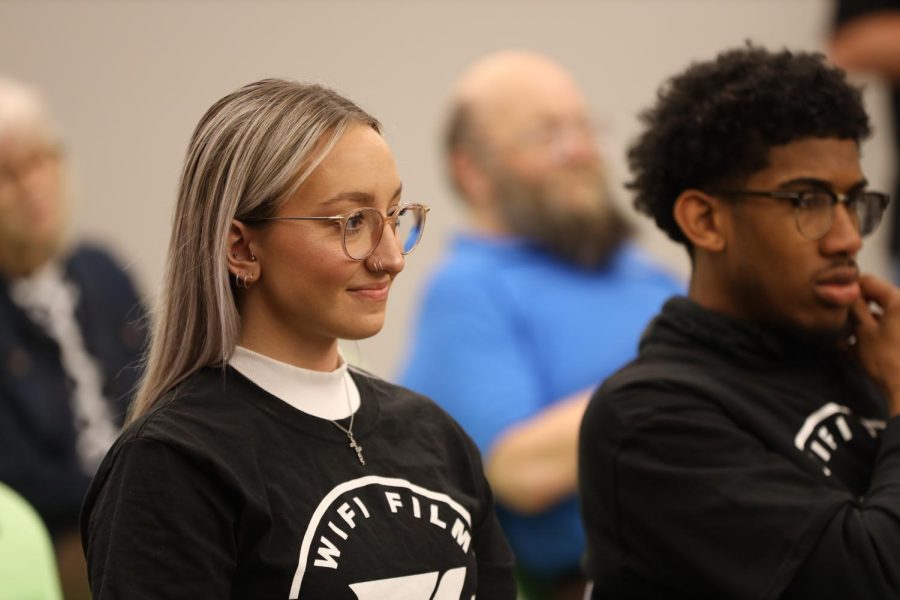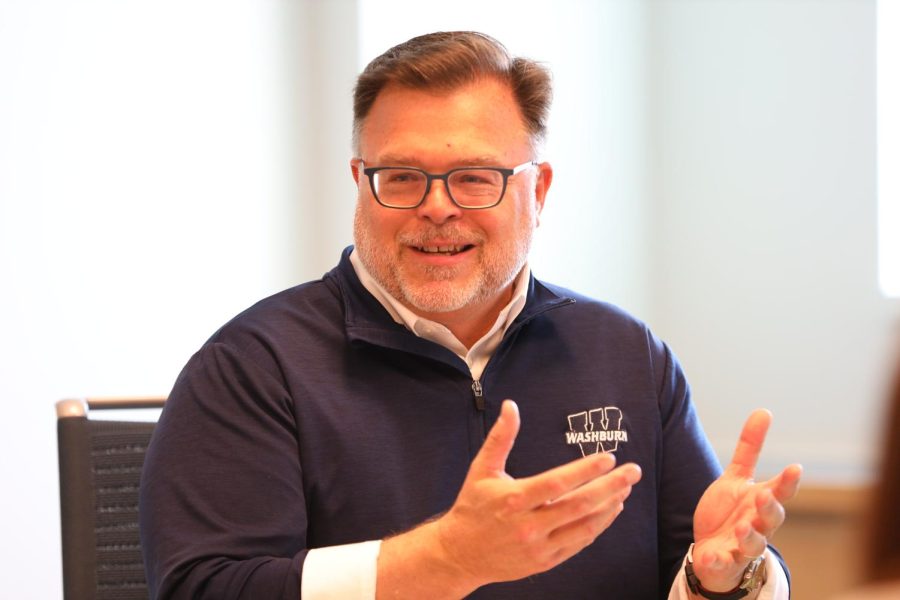Rhyan Cropper, a WIFI team member, listens intently during the Women’s Panel. The panel featured various women in filmmaking.
WIFI features workshops and Q&As
The WIFI Film Festival continued into Saturday, April 22 at the Topeka & Shawnee County Public Library. This event featured workshops with multiple filmmakers, a woman’s panel and 30 featured films from 23+ countries. The accepted films were separated into seven categories and shown at Arts Connect and T&SCP Library.
Over 106 films were submitted to this year’s festival. The WIFI Film Festival is a great opportunity for students and filmmakers to show off their hard work and have an opportunity to win an award for their film.
The day started with a workshop with Dennis Etzel Jr., senior lecturer of English and award-winning author, on healing. Etzel discussed using writing and cinema therapy as options for healing.
Cinema therapy is a form of expressive therapy where one watches movies as therapeutic tool.
Etzel expressed using this form of therapy for his own healing and inspiration for his writing. He also spoke on flash writing where one writes about whatever they’d like as a way of expression. Etzel stated that the goal of free writing is to keep your pen moving and to “discover whatever new things that might come out of letting go.”
Another workshop focused on health and healing featured by Allan Holzman, a filmmaker, discussed the Martin Luther King Jr. speech. Holzman created a short film centered around Martin Luther King Jr.’s speech and described to the audience the process of his filmmaking.
“You have to plan every step of the way,” Holzman said.
Holzman’s film about MLKJ has special effects that feature multiple split screens. He started experimenting with multi-screens in 1999 when he worked on a project with Bill Nye the Science Guy. Holzman advises filmmakers that are editing with multi screens to cut a few seconds a day in a film.
This festival can really impact filmmakers and actors in a beneficial way. One director, Lindsey Louise Doolittle, had her film “Emerging Artists” shown at the festival. Emerging Artists is a program in KC where adults with intellectual and developmental delays create art that is sold to the public. “As artists, trying to be seen and heard in gallery spaces or museums, it’s really difficult. But for those who have a disability, it’s that much harder or nonexistent. And so I want to stand beside them,” said Doolittle. She also has two more films that she is currently working on and her works can be found on her website here.
Another workshop presented by Rick LeJuerrne, lecturer of the School of Business, focused on entrepreneurship within filmmaking. LeJuerrne recognized a convergence between filmmaking and entrepreneurship describing independent filmmakers as entrepreneurs.
LeJuerrne described an entrepreneur with a quote by Seth Godin, an author and founder of altMBA and The Marketing Seminar. Godin states that an entrepreneur makes decisions and invests in activities and assets that aren’t necessarily sure yet. He also says that entrepreneurs are willing to persuade others to support missions with a non guaranteed outcome and embrace the doing things that might not work.
LeJuerrne used Steven Spielberg as a prime example of a filmmaker with skills in entrepreneurship. In creating the movie “Jaws” Spielberg endured several complications including the fact that their shark prop was nonfunctional. Instead of giving up, Spielberg used his skills in entrepreneurship not giving up, creating new ways to shoot scenes on the fly and working through a project that to the outside eye, may have seemed like a failure. Because of Spielberg’s perseverance, “Jaws” became one of the most popular films grossing over 476 million dollars.
The participants seemed interested by this cross over between filmmaking and entrepreneurship. Darria Dennison, filmmaker and Washburn alumna, gave her thoughts on LeJuerrne’s presentation.
“I wish there was a class that melded the two when I was going to Washburn but I’d had a little bit of experience with Matt and a previous student in developing an LLC for a specific project. And so that part of it was familiar to me, but also having that business model canvas. I’m going to copy and make many uses of that because I would like to start a production company again,” Dennison said.
WIFI also screened a short film titled “The Pulpit.” The filmed followed Sarah Williams as a midwestern pastor who finds her purpose at the pulpit. Yet, after recieving a death threat in the mail she seeks help from the FBI and experiences trauma through the process. Before viewing the film, the floor was open for a Q&A with the producers of the film, Tosin Morohunfola, Christian Watkins and Christopher Commons. To learn more about “The Pulpit” visit their website here.
Ending the day at T&SCP Library, WIFI also featured a Women’s Panel, moderated by Sue Vicory, to discuss health and healing through filmmaking. The panel featured Lolo Loren, Jamie Morrow, Mary Pruitt, Daria Dennison and Jill Gevargizian.


